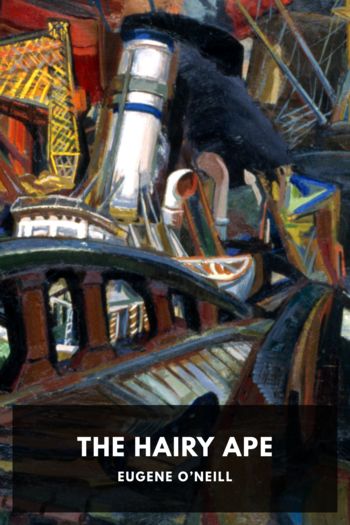The Atmospherians Alex McElroy (i like reading .txt) 📖

- Author: Alex McElroy
Book online «The Atmospherians Alex McElroy (i like reading .txt) 📖». Author Alex McElroy
He insisted the plan was simple: The men would arrive at his property in a week. Over the next six days, he and I would prepare the camp, brainstorm strategies for transforming these men, strategies for bringing The Atmosphere to the public’s attention—“For your sake,” he said, though I knew Dyson was desperate for notoriety, albeit too proud to ever admit his desperation. He promised me a beautiful cabin in the woods and men who were ready to grow and evolve.
“How does that sound?” he asked.
“Too good to be true,” I said.
“Sometimes things can be good and true. Have confidence in me for once. Just trust I know what I’m doing.”
He was right: I had no confidence in him. But if something went wrong, I had confidence in myself to fix it, or escape. I stood and leaned against the railing, rested my arms over the edge.
Dyson took this for what it was: a sign I would join him. He edged in beside me, shoulder to shoulder, and I felt unexpectedly safe.
A young girl screamed from the ground floor of the mall.
She was pointing at a purple helium balloon that was drifting to the ceiling. “I got it!” Dyson shouted. It was a foolishly confident thing to say and even more foolish for him to stretch over the railing. I pressed a hand to his back to hold him in place. I was sure the balloon would slip past him, that a gust of central air would blow it beyond his reach and that he’d tumble over the railing to his death. But he palmed the balloon with one hand and cradled it to his chest. He rushed down the escalators to deliver it to the girl. Bystanders applauded the miracle they had witnessed. The girl hugged the balloon. Dyson refused the mother’s attempt to slip him some bills. He ascended the escalators as if gliding on a wave of his own self-satisfaction and pride. A bright, blinding light of inevitability shined inside me: Perhaps I had every reason to trust him. Everything he described would happen exactly as he described it. I was sure of it then.
The girl released the balloon. A collective gasp spread through the mall.
three
IN THE ALTERNATE version of my life, I turn Dyson down and move to a dusty bedroom community with a name like Oak Bluff or Bounty or Franklin, any whitewashed suburb where the townsfolk brag about farmers’ markets and walking trails and really breathing the air. In this life, I answer phones at a charter school. I marry a man named Kevin with soda can thumbs and a forehead the size of a billboard. He owns a landscaping company. He accuses me of cheating on him with every man we pass in the street. We create three unconscionably ugly children who adore plain bagels and lizards. I might appear happy—I might even convince myself of this—but I would be brittle with boredom, a musty husk of myself tumbling through a life I abhor.
Dyson knew I would never settle for such a life. I wanted the life I had earned, the life that had been taken away from me. I wanted to matter again. This was what he offered me, and I accepted the offer. I buckled in and moved to The Atmosphere, not only because I wanted to, as Dyson insisted, make the world safer, but because I was angry: at Cassandra and Blake and Lucas Devry and the hundreds of men who traded shifts outside my apartment and the thousands who’d threatened my life online and the millions who merely existed. I wanted to be better than them. I needed them to know that I was.
Nevertheless, I often daydream about that quiet life in the suburbs with three kids and a Kevin. It happens more frequently than I would like. That life is an escape hatch from the pressure I find myself under now. No, that life would not have satisfied me. I would not be happier there—which isn’t to say that I’m happy today. But I would not feel so guilty. If I had chosen that life, Dyson would still be alive.
four
DYSON AND I met on the bus on the first day of third grade. The summer just before, my mother had moved us into the house neighboring his. “Row six. Two-seater,” said the bus driver when I boarded. He was bulbous and gruff, with eyebrows as thick as pelts and a metal bar through his septum. Dyson sat in the three-seater across the aisle, the only other kid on the bus. He and I lived on the outskirts of town—people called it the boonies, though I hate the word boonies, with its whiff of condescension and terror—and our rides lasted half an hour longer than everyone else’s. The driver resented us for this. So he demanded silence from Dyson and me.
As the bus filled, Dyson made fart and sex noises for the kids passing his seat, or he clapped his puffed, freckled cheeks or lifted his shirt and shimmied to shake the flab of his stomach. He was a chunky kid who used his chunkiness to amuse. Sex and fart sounds were not, on their own, inherently funny, but to children these sounds were hilarious when delivered by a fat kid. They laughed in passing. They fondled his tummy. “Fuckin’ Dyson,” the sixth graders said. Sure, nobody sat with him—but they appreciated the work he put into debasing himself. They remembered his name. In class later that day, he imitated our homeroom teacher when she turned around to write on the board, her gestures distorted by





Comments (0)